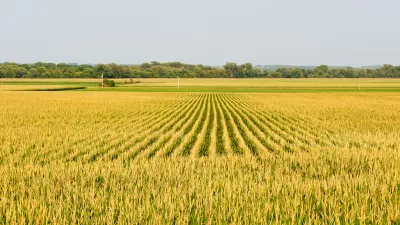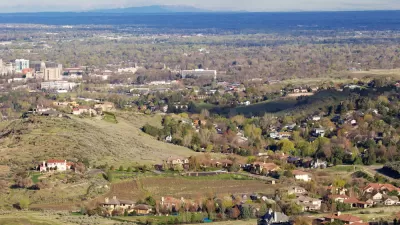The history of the earth since 1700 has been a history of human land use.

David Montgomery shares the findings of research led by Erle Ellis, a researcher at the University of Maryland, Baltimore County.
According to Montgomery, Earle and team's results show startling changes:
Three centuries ago, humans were intensely using just around 5 percent of the planet, with nearly half the world’s land effectively wild. Today, more than half of Earth’s land is occupied by agriculture or human settlements.
Earle is quoted in the article saying that climate change will someday surpass land use as the "dominant shaper of ecology in the terrestrial real." But presently and for the last several hundred years, it's been land use.
The research is supplemented by a map that shows the transformation of human land use since 1700:
Even with only one snapshot per century, the animation makes some of the trends obvious," writes Montgomery. "Large swathes of Russia and the United States become cropland over the 19th century, while livestock occupies increasing amounts of previously semi-wild land in Africa and Asia.
The maps included in the article illustrate the history of land uses on the entirety of the earth's landmass, urban and village uses, and the history of land uses in Europe.
FULL STORY: How 300 Years of Urbanization and Farming Transformed the Planet

Alabama: Trump Terminates Settlements for Black Communities Harmed By Raw Sewage
Trump deemed the landmark civil rights agreement “illegal DEI and environmental justice policy.”

Planetizen Federal Action Tracker
A weekly monitor of how Trump’s orders and actions are impacting planners and planning in America.

How Atlanta Built 7,000 Housing Units in 3 Years
The city’s comprehensive, neighborhood-focused housing strategy focuses on identifying properties and land that can be repurposed for housing and encouraging development in underserved neighborhoods.

In Both Crashes and Crime, Public Transportation is Far Safer than Driving
Contrary to popular assumptions, public transportation has far lower crash and crime rates than automobile travel. For safer communities, improve and encourage transit travel.

Report: Zoning Reforms Should Complement Nashville’s Ambitious Transit Plan
Without reform, restrictive zoning codes will limit the impact of the city’s planned transit expansion and could exclude some of the residents who depend on transit the most.

Judge Orders Release of Frozen IRA, IIJA Funding
The decision is a victory for environmental groups who charged that freezing funds for critical infrastructure and disaster response programs caused “real and irreparable harm” to communities.
Urban Design for Planners 1: Software Tools
This six-course series explores essential urban design concepts using open source software and equips planners with the tools they need to participate fully in the urban design process.
Planning for Universal Design
Learn the tools for implementing Universal Design in planning regulations.
Jessamine County Fiscal Court
Caltrans
Institute for Housing and Urban Development Studies (IHS)
City of Grandview
Harvard GSD Executive Education
Toledo-Lucas County Plan Commissions
Salt Lake City
NYU Wagner Graduate School of Public Service





























